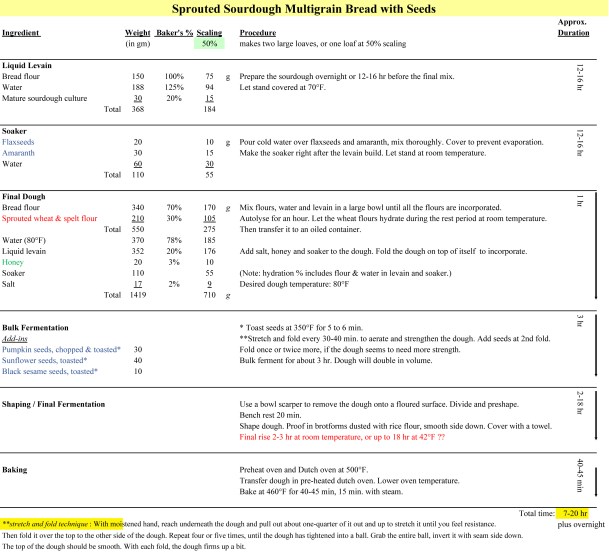 This sourdough bread is made with four grains: white bread flour (70%), sprouted wheat and sprouted spelt (for a combined 30%) and amaranth. The seeds are flaxseeds, pumpkin, sunflower and black sesame seeds (making up about 18% of total flour weight).
This sourdough bread is made with four grains: white bread flour (70%), sprouted wheat and sprouted spelt (for a combined 30%) and amaranth. The seeds are flaxseeds, pumpkin, sunflower and black sesame seeds (making up about 18% of total flour weight).
The long list of mostly wholesome ingredients conjures up the image of a nutrient dense bread. This recipe was a rough adaptation to David Lebovitz’s multigrain bread in The Paris Kitchen. Similar ingredients to his recipe with additional sprouted whole grains but a very different mixing (or rather undermixing) and fermentation (or slow) process was used. A half-way decent levain bread was the result.
With over 30% of sprouted whole grains and 18% of seeds in the dough, you won’t expect an open crumb texture to the finished loaves, but they are. The sourdough levain contributes to a flavorful tang and excellent keeping quality of the bread. The flaxseeds and amaranth were soaked in cold water so that I can check the hydration at the time of mixing. (Although, in retrospect, I may not have been as careful as I should.) The flour, water and levain mix was autolysed for an hour since whole wheat flours would benefit from a longer resting period. See the cheat sheet below for details.
I scratched my head thinking that: this may be the best laid plan, but somehow something is falling short. With no ears, no bloom, the bread sadly spread out like that of a ciabatta. Oh, well! This was not what I’ve expected, comparing with similar multigrain or seed breads I posted previously (as shown below).
Every bake is unique: the workmanship of risk. That’s what makes bread-making magical. Consider the following for an improved seed bread:
- Add the seeds an hour into bulk fermentation when the gluten has built some strength. Or roll them to coat the shaped dough so they don’t interfere with gluten development, give the bread some sheen and prevent the dough from sticking.
- Another round of stretch-and-fold may help to build dough strength and elasticity.
- Reduce and carefully adjust hydration level. The dough was slack and almost too sticky to handle after the first and second rise.
- For comparison, let one dough proof and bake directly in a loaf pan which supports a taller structure. (See the sunflower seed bread.)
- Be watchful: The dough may be overproof given the more active enzyme activity with sprouted flour.
Please visit the online group Cook-the-book-fridays to see how we tackle the multigrain bread, what works and what doesn’t. Our goal is to work through each and every recipe in David Lebovitz’s My Paris Kitchen. You are welcome to join the group and bake along with us.











7 Comments
Mardi (eat. live. travel. write.)
May 19, 2017 at 5:08 pmWell I think your loaf looks marvelous! I need to play around with the recipe too as while ours was tasty, I wasn’t super satisfied with the crumb following the recipe exactly…
MARY H HIRSCH
May 20, 2017 at 12:10 amWell, Shirley, I just visited all your bread posts and received quite a tutorial in bread making. Your Vermont Sourdough was beautiful. And, I’m not sure I’ve seen a cast iron rectangular pan before. I’m sure Mr. Google can set me on the right path to find one. While you might have been disappointed with the result, your bread looked fine to me. Very nice, in fact. But, I do love a perfectionist. I had the time tonight to go back and read many of your posts not related to CTBF. Such fun. I always learn something from you.
Shirley @ everopensauce
May 20, 2017 at 12:44 amThank you for your kind words, Mary. I don’t know whether it is being a perfectionist or OCD that drives me to the thick of things. I do like learning about a wide range of issues. May I direct you to one other post (https://www.everopensauce.com/cranberry-pecan-harvest-bread-a-tale-of-baking-in-two-cities/) which shows a picture of one of my favorite dutch ovens. I have way too many. But I do make very good use of them, whether baking or cooking.
Teresa
May 20, 2017 at 2:31 amI love the way you used David’s recipe as a jumping off point for a levain bread. Your breads turned out beautifully, even if the shape surprised you a bit.
betsy
May 20, 2017 at 8:51 pmShirley, your sourdough (real) multigrain version of this one is inspiring. I haven’t baked with sprouted wheat before, though I did buy some a few months ago. Next time I’m going to try my favorite sourdough multigrain loaf with David’s seed combo and see what happens.
Shirley @ everopensauce
May 21, 2017 at 10:26 amI have been experimenting with sprouted flour and have been encouraged by the results. With all the talk about carb and gluten, it helps to explore alternatives. Also, I have baked bread with nothing but grains and seeds. That’s very different. Lots to explore! All fun stuff. Happy baking.
Emily
May 25, 2017 at 2:13 amVery informative blog, yours is! Your ctbf loaf looks fine to me though. This will be a make-up/catch up recipe for me in June.